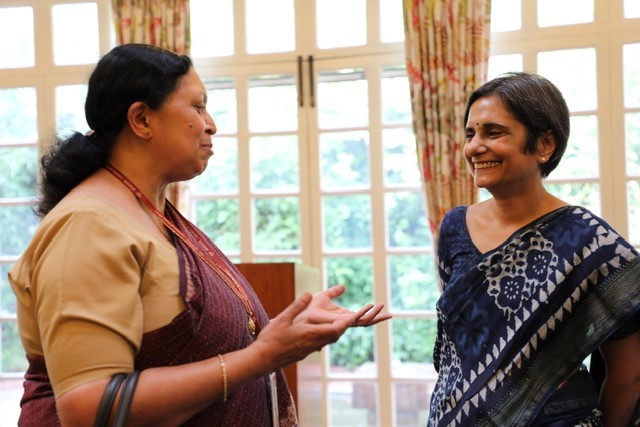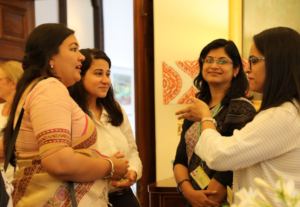27th June 2019 King Charles Street, London
Celebrating women in science

Someone rightly said, the only barrier to promotion should be talent and effort. But women who account for almost 50% of the world’s population, whose contributions to our society are key to its functioning, despite exceling in a variety of fields have abysmal representation in them. One such area is Science, where less than 30% of the workforce are women. So, when a Newton-Bhabha alumnus Prof. Gagandeep Kang was elected as a fellow of the oldest scientific academy in continuous existence, the Royal Society, we thought of celebrating! The Royal Society Fellows are amongst the most distinguished scientists, recognised for their exceptional contributions in their area of work. A high tea was hosted by the British High Commissioner to India, Sir Dominic Asquith, to celebrate this occasion and recognise achievements of women in the field of science.
 After being a part of the Newton team for almost eight months, this was the first big event I was involved in organising. From planning its structure to finalising the guest list, the entire process was exciting (also, visiting the High Commissioner’s Residence for the first time). Despite the new Indian government’s swearing in ceremony causing major traffic rerouting on the day, the Newton-Bhabha: Women in Science event witnessed attendance by a diverse audience that included STEM scientists, social scientists, researchers, government officials, corporates and innovation experts.
After being a part of the Newton team for almost eight months, this was the first big event I was involved in organising. From planning its structure to finalising the guest list, the entire process was exciting (also, visiting the High Commissioner’s Residence for the first time). Despite the new Indian government’s swearing in ceremony causing major traffic rerouting on the day, the Newton-Bhabha: Women in Science event witnessed attendance by a diverse audience that included STEM scientists, social scientists, researchers, government officials, corporates and innovation experts.
 It was quite an experience watching these women (and some men) who were some of our Newton alumna, delivery partners and key policy makers discussing opportunities and challenges they faced in their respective fields and how they are striving to find real world solutions to real world problems. One could also spot old colleagues catching up, revisiting old times.
It was quite an experience watching these women (and some men) who were some of our Newton alumna, delivery partners and key policy makers discussing opportunities and challenges they faced in their respective fields and how they are striving to find real world solutions to real world problems. One could also spot old colleagues catching up, revisiting old times.
The event saw speeches by Prof. Kang during which she shared her life’s journey in science that left the audience awestruck and Sir Dominic Asquith who called her ‘a wonderful example of that living bridge between the two countries’. Both emphasised the importance of giving women more opportunities to make their careers in sciences. Prof. Kang also shared how she started working on the ‘less fashionable’ rota virus and how simple networking helped her expand the project from the UK to India and then with Malawi!
 Being a woman scientist myself, I understand the importance of programmes like the Newton-Bhabha Women in Science programme being led by the British Council with IISER Pune, which is introducing women to the different aspects of science careers. Amidst all this, I also got a chance to speak with Prof. Kang who is also known as the godmother of Indian vaccines. Despite all the buzz about her becoming a Fellow of the Royal Society, you could see her passion towards providing better health care facilities especially for children. She also talked about how she benefitted from association with the Newton-Bhabha fund and said that:
Being a woman scientist myself, I understand the importance of programmes like the Newton-Bhabha Women in Science programme being led by the British Council with IISER Pune, which is introducing women to the different aspects of science careers. Amidst all this, I also got a chance to speak with Prof. Kang who is also known as the godmother of Indian vaccines. Despite all the buzz about her becoming a Fellow of the Royal Society, you could see her passion towards providing better health care facilities especially for children. She also talked about how she benefitted from association with the Newton-Bhabha fund and said that:
‘What the Newton-Bhabha Fund allowed us to do was to work with researchers in the UK, Malawi and in India to be able to access populations in all these area to try and understand why vaccines don’t work well.’
The Newton-Bhabha fund offers multiple programmes covering a wide spectrum from capacity building programmes to funding research projects through to the translation of research into innovation. Currently, the fund has more than 40 programmes running, providing funding and capacity building opportunities to researchers in both the UK and India to partner with the UK and Indian organisations and universities.
